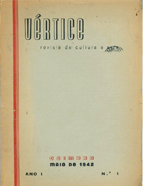

................................
The reviews were also a means of distinguishing this work from other forms of writing history, particularly scholarly history – a “good archive of facts”, as Alberto Ferreira characterised a work by Fr. Mário Martins (no. 172, Jan. 1958, 64) – or the “amateurs of Clio” who did not meet a series of prerequisites that characterised the “profession of historian”, as Joel Serrão lamented in one of these reviews (no. 95, July 1951, 383-4). This demarcation resulted in the creation of a more or less precise notion of historiographical identity, of a “scientific community” of historians. In fact, many of the critical reviews in Vértice were of works by other contributors. In a review by Armando Castro of Situação Económica no Tempo de Pombal by Borges de Macedo – a work also analysed in Vértice by Joel Serrão – conveys the idea of “a scant half-dozen authors” who, “without the support of academies or universities”, were working to reduce the gap between concrete achievements and “recognition of the true scientific orientation “ (no. 107, July 1952, 378). This identity construction would be further developed three years later in a lecture given by Magalhães Godinho in São Paulo (Essays, vol. III, 241-2) and highlighted by Rui Feijó in Vértice in a series of reviews on the Revista de História de São Paulo and the Annales (no. 86, Oct. 1950, 263-4). As has been pointed out, there was a close affinity between the Marxist ideas and those of the Annales among several contributors to Vértice, but there was also some distance, as Armando de Castro (no. 220, Jan. 1962, 59-62) and Vital Moreira pointed out in relation to “a certain tendency [in the Annales] to treat prices as an independent variable with its own logic” (nos. 334-5, Nov.-Dec. 1971, 912).
This work is financed by national funds through FCT - Foundation for Science and Technology, I.P, in the scope of the projects UIDB/04311/2020 and UIDP/04311/2020.
